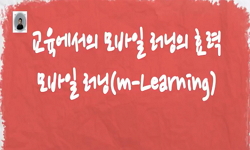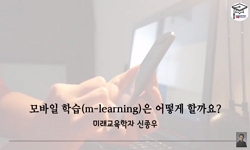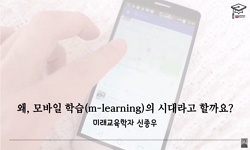The purpose of this study is to investigate the effects of mobile-mediated learning on university students` English writing achievement and to explore their perspectives on using mobile devices in terms of cooperative learning, affective aspects and l...
http://chineseinput.net/에서 pinyin(병음)방식으로 중국어를 변환할 수 있습니다.
변환된 중국어를 복사하여 사용하시면 됩니다.
- 中文 을 입력하시려면 zhongwen을 입력하시고 space를누르시면됩니다.
- 北京 을 입력하시려면 beijing을 입력하시고 space를 누르시면 됩니다.

대학생 영어 쓰기 학업성취도에 미치는 모바일 학습의 효과 = The effects of mobile-mediated learning on university students` English writing achievement
한글로보기https://www.riss.kr/link?id=A103332763
- 저자
- 발행기관
- 학술지명
- 권호사항
-
발행연도
2017
-
작성언어
-
- 주제어
-
KDC
700
-
등재정보
KCI등재
-
자료형태
학술저널
- 발행기관 URL
-
수록면
84-113(30쪽)
-
KCI 피인용횟수
5
- DOI식별코드
- 제공처
-
0
상세조회 -
0
다운로드
부가정보
다국어 초록 (Multilingual Abstract)
The purpose of this study is to investigate the effects of mobile-mediated learning on university students` English writing achievement and to explore their perspectives on using mobile devices in terms of cooperative learning, affective aspects and learning effects. For 10 weeks, a total of 48 university students majoring in Business English used the KakaoTalk in a classroom as a mobile messenger to enhance mobile-mediated group talk for the purpose of improving their writing skills for 20 minutes a week. In order to investigate if participants improved their writing skills, the pre and post TOEIC writing essay test were administered. Two classes were assigned into an experimental group vs. a traditional group depending on the use of the mobile-mediated group talk. A comparison analysis of the pre/post test, T-test and Ancova was performed to compare two groups` statistical differences. To examine the students` perceptions on using mobile-mediated group talk, data was collected from the students` survey and an interview. The major findings of the study are as follows. First, participants who used mobile-mediated group talk improved their writing achievement, and there was statistical significance in writing scores found in the posttest. Second, statistical differences between the control group without mobile apps and the experimental group with mobile apps was not significant in terms of mean differences in writing achievement. Third, students` responses to the questionnaires showed that the they found the traditional group talk in the classroom was more helpful and effective in learning than the mobile-mediated group talk. Fourth, there was no gender difference between males and females in terms of writing achievement. Based on the findings, educational implications for further research are discussed.
참고문헌 (Reference)
1 현승혜, "휴대전화 적용이 협력적 영어작문과 흥미에 미치는 영향에 관한 연구" 한양대학교 대학원 2010
2 서예은, "협동학습 기반의 Flipped Learning 모델 활용 수업이 영어성취도 및 태도에 미치는 영향" 한국영어학회 15 (15): 765-793, 2015
3 이지선, "학습자 요구 분석에 따른 스마트폰 어휘 학습용 어플리케이션의 구현" 한국컴퓨터교육학회 15 (15): 43-53, 2012
4 강정순, "팝송을 활용한 모바일 영어듣기 학습 컨텐츠 설계 및 구현 : 초등학교 6학년을중심으로" 3 (3): 17-32, 2006
5 김재경, "웹기반 쓰기와 스마트 미디어를 활용한 모바일 기반 영어쓰기의 비교 연구" 한국정보기술학회 10 (10): 197-204, 2012
6 김주혜, "영어학습 정보에 대한 한국학습자들의 태도 및 행동사례 연구" 9 (9): 281-298, 2005
7 한상준, "스마트러닝 효과성 메타분석 연구" 한국수산해양교육학회 26 (26): 148-155, 2014
8 권연희, "스마트 어플리케이션을 활용한 대학생 영어 학습 사례 연구" 한국멀티미디어언어교육학회 16 (16): 37-65, 2013
9 하현준, "스마트 교육기반의 애플리케이션을 활용한 고등학교 영어쓰기 학습만족도 및효과에 관한 연구" 인천대학교 2017
10 곽정아, "소셜 네트워크 서비스 활용 영어 교수 및 학습에 대한 대학생의 인식" 한국외국어대학교 교육대학원 2013
1 현승혜, "휴대전화 적용이 협력적 영어작문과 흥미에 미치는 영향에 관한 연구" 한양대학교 대학원 2010
2 서예은, "협동학습 기반의 Flipped Learning 모델 활용 수업이 영어성취도 및 태도에 미치는 영향" 한국영어학회 15 (15): 765-793, 2015
3 이지선, "학습자 요구 분석에 따른 스마트폰 어휘 학습용 어플리케이션의 구현" 한국컴퓨터교육학회 15 (15): 43-53, 2012
4 강정순, "팝송을 활용한 모바일 영어듣기 학습 컨텐츠 설계 및 구현 : 초등학교 6학년을중심으로" 3 (3): 17-32, 2006
5 김재경, "웹기반 쓰기와 스마트 미디어를 활용한 모바일 기반 영어쓰기의 비교 연구" 한국정보기술학회 10 (10): 197-204, 2012
6 김주혜, "영어학습 정보에 대한 한국학습자들의 태도 및 행동사례 연구" 9 (9): 281-298, 2005
7 한상준, "스마트러닝 효과성 메타분석 연구" 한국수산해양교육학회 26 (26): 148-155, 2014
8 권연희, "스마트 어플리케이션을 활용한 대학생 영어 학습 사례 연구" 한국멀티미디어언어교육학회 16 (16): 37-65, 2013
9 하현준, "스마트 교육기반의 애플리케이션을 활용한 고등학교 영어쓰기 학습만족도 및효과에 관한 연구" 인천대학교 2017
10 곽정아, "소셜 네트워크 서비스 활용 영어 교수 및 학습에 대한 대학생의 인식" 한국외국어대학교 교육대학원 2013
11 김동현, "성공적인 m-Learning 구현을 위한 핵심 요인에 대한 연구" 연세대학교 대학원 2005
12 김동규, "사이버 공간에서의 영어 일기쓰기가 초등학생들의 영어 쓰기 능력 및 정의적 영역에 미치는 영향" 팬코리아영어교육학회 19 (19): 109-6, 2007
13 최은주, "모바일을 활용한 자기 주도적 영어 어휘 학습" 중앙대학교 대학원 2006
14 이정은, "모바일을 활용한 대학생 영어 말하기 녹음과제의 효과성" 대한영어영문학회 38 (38): 267-297, 2012
15 안희영, "모바일기반 영어일기쓰기가 초등학생 쓰기능력과 정의적 측면에 미치는 영향" 사이버한국외국어대학교 TESOL 대학원 2014
16 조세경, "모바일 중심 외국어교육의 현황과 전망" 한국멀티미디어언어교육학회 10 (10): 187-201, 2007
17 김경옥, "모바일 기반 SNS를 활용한 과정 중심 초등영어 쓰기 학습의 효과" 경인교육대학교 교육전문대학원 2014
18 윤정주, "모바일 기기를 활용한 u-러닝 영어 학습모형 연구" 한국멀티미디어언어교육학회 10 (10): 131-153, 2007
19 이주민, "모바일 교육 서비스의 국내외 현황 및 모바일 교육 서비스 시대를 준비하는사이버대학교에 대한 제언" 1 (1): 91-118, 2011
20 장은지, "모바일 SNS 기반 영어어휘학습에 나타난 학습자 반응 분석 - 카카오톡 어플리케이션을 중심으로" 미래영어영문학회 15 (15): 145-165, 2010
21 정숙경, "대학생들의 어학 도구로서의 스마트폰에 대한 인식과 사용 현황에 대한 연구" 한국멀티미디어언어교육학회 15 (15): 165-185, 2012
22 Roger, B., "Writing for the real world" Oxford University Press 2005
23 Wigglesworth, G., "What role for collaboration in writing and writing feedback" 21 (21): 364-374, 2012
24 Yim, S., "Web-based collaborative writing in L2 contexts : Methodological insights from text mining" 21 (21): 146-165, 2017
25 Myers, M., "Voice recognition software and a hand-held translation machine for second-language learning" 13 (13): 29-41, 2000
26 Tsai, C. -C., "Using a conflict map as an instructional tool to change student alternative conceptions in simple series electric-circuits" 25 : 307-327, 2003
27 Aydin, Z., "Using Wikis to promote collaborative EFL writing" 18 (18): 160-180, 2014
28 Nyiri, K., "Towards a philosophy of m-learning" 2002 : 121-124, 2002
29 Harklau, L., "The role of writing in classroom second language acquisition" 11 (11): 329-350, 2002
30 Williams, J., "Teaching writing in second and foreign language classrooms" McGraw-Hill 2005
31 Morton, H., "Speech interactive computer-assisted language learning : A cross-cultural evaluation" 23 (23): 295-319, 2010
32 Wolff, D., "Second language writing : A few remarks on psycholinguistic and instructional issues" 10 : 107-112, 2000
33 Oxford, R. L., "Second language research on individual differences" 13 : 188-205, 1993
34 전영주, "QR 코드를 활용한 영어과 스마트 수업 모형 연구" 한국멀티미디어언어교육학회 16 (16): 125-143, 2013
35 Miangah, T., "Mobile-assisted language learning" 3 (3): 309-319, 2012
36 Levy, M., "Mobile learning: A handbook for educators and trainers" Routledge 76-83, 2005
37 Kukulska-Humle, A., "Mobile learning: A handbook for educators and trainers" Routledge 2005
38 Sandberg, J., "Mobile English learning : An evidence-based study with fifth graders" 57 : 1334-1347, 2011
39 Anderson, J. N., "Language learning with interactive virtual agent scenarios and speech recognition : Lessons learned" 19 : 605-619, 2008
40 Stockwell, G., "Investigating learner preparedness and usage pattern of mobile learning" 20 (20): 253-270, 2008
41 Chinnery, G., "Going to the MALL : Mobile assisted language learning" 10 (10): 9-16, 2006
42 Kiernan, J., "Cell phones in task-based learning: Are cell phones useful language learning tools?" 16 (16): 71-84, 2004
43 Cohen, A. D., "Assessing language ability in the classroom" Heinle & Heinle Publishers 1994
44 Kwon, Y., "An analysis of smartphone applications for English education" 2011
45 Chiu, T-L., "A study of web-based oral activities enhanced by automatic speech recognition for EFL college learning" 20 (20): 209-233, 2007
동일학술지(권/호) 다른 논문
-
자기주도 외국어학습 시스템 구축 수단으로서의 모바일 탄뎀(Tandem) 소통
- 한국멀티미디어언어교육학회
- 하수권 ( Ha Su-guen )
- 2017
- KCI등재
-
- 한국멀티미디어언어교육학회
- ( Su Kyoung Mo )
- 2017
- KCI등재
-
Using Learner Response Systems in EFL Classrooms: Students` Perspectives and Experience
- 한국멀티미디어언어교육학회
- ( Seo Young Yoon )
- 2017
- KCI등재
-
- 한국멀티미디어언어교육학회
- 신동광 ( Shin Dongkwang )
- 2017
- KCI등재
분석정보
인용정보 인용지수 설명보기
학술지 이력
| 연월일 | 이력구분 | 이력상세 | 등재구분 |
|---|---|---|---|
| 2027 | 평가예정 | 재인증평가 신청대상 (재인증) | |
| 2021-01-01 | 평가 | 등재학술지 유지 (재인증) |  |
| 2018-01-01 | 평가 | 등재학술지 유지 (등재유지) |  |
| 2015-01-01 | 평가 | 등재학술지 유지 (등재유지) |  |
| 2014-10-02 | 학회명변경 | 영문명 : 미등록 -> Korea Association of Multimedia-Assisted Language Learning |  |
| 2011-01-01 | 평가 | 등재학술지 유지 (등재유지) |  |
| 2009-01-01 | 평가 | 등재학술지 유지 (등재유지) |  |
| 2007-01-01 | 평가 | 등재학술지 유지 (등재유지) |  |
| 2006-07-27 | 학술지등록 | 한글명 : 멀티미디어 언어교육외국어명 : Multimedia-Assisted Language Learning |  |
| 2004-01-01 | 평가 | 등재학술지 선정 (등재후보2차) |  |
| 2003-01-01 | 평가 | 등재후보 1차 PASS (등재후보1차) |  |
| 2001-07-01 | 평가 | 등재후보학술지 선정 (신규평가) |  |
학술지 인용정보
| 기준연도 | WOS-KCI 통합IF(2년) | KCIF(2년) | KCIF(3년) |
|---|---|---|---|
| 2016 | 1.23 | 1.23 | 1.13 |
| KCIF(4년) | KCIF(5년) | 중심성지수(3년) | 즉시성지수 |
| 1.13 | 0.99 | 1.483 | 0.26 |




 KCI
KCI KISS
KISS






